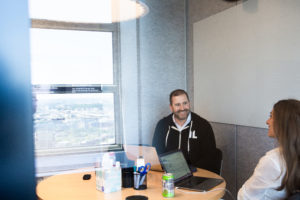
Your resumé (often called curriculum vitae or CV) is more important than you think. It’s the decryption key that unlocks your dream job interview. But many people overlook it; they write it up and send it off to as many roles as possible. A resumé isn’t a wordlist to be used in a brute force attack.
Your resumé is a summary of your career. You should update it as you progress, reach major milestones, and complete noteworthy projects. You should have your resumé ready for internal moves too, as they also come in handy for performance reviews and professional development conversations. It’s a clear record of your achievements and key duties.
Try to update your resumé every three months and check if it’s an accurate reflection of what you can bring to the table in your next role.
So what should you include in this working document? Here are some handy tips.
1. The basics
Your resumé should include your name, your phone number and your email address. Start your resumé with a few lines about yourself. Bring some personality to it and state your career goals clearly. Then, outline each of your roles including the job title, the company you worked for, the dates you were there, an overview of your key duties – but most importantly, your achievements.
Whilst not essential, a brief cover note is always worthwhile, particularly if an organization is fortunate to receive strong interest in a role. You might like to highlight why you’re interested in the opportunity and the company, and highlight the parts of your resumé that might be relevant to the position.
2. Your resumé isn’t a ‘one size fits all’ document
If you’re searching methodically and sticking to self-made criteria for your next move, you won’t be applying for 40 jobs a day. It’s also pretty obvious to a recruiter when you’re applying for 40 jobs a day. Bulk applying doesn’t necessarily speed up your chance of getting a job – it’s quite the opposite. It could actually damage the likelihood of securing your next role.
Read through the job advert and highlight the key aspects of the role and the experience required. Cross reference this against your own resumé and make sure any elements you haven’t mentioned in your document are covered (that is, if you have experience in them). Remember, you’re trying to show why you’re the best match for this role on a piece of paper. If you don’t include it in your resumé, how will the hiring manager know you have experience in a specific area?
You could blow a chance at getting an interview by not taking the resumé writing process seriously. It’s easily overlooked by the most experienced and senior level candidates as there’s always an assumption that a job title says it all. But that’s false! So you need to detail your key responsibilities and achievements. In addition, if you have a quirky job title, it may be prudent to take a look at the job market and edit this to have a more commonly known title on your resumé.

3. Formatting
Formatting sounds boring but it is important. How many times have you read a badly written job advert and not applied because you lost interest? The same goes for your resumé.
Your document needs to be laid out clearly. Start with an introduction then list your work experience in chronological order, starting with your most recent role, as that’s the experience the recruiter will be most interested in reading about.
The internet has a whole host of tools and templates available for writing tip-top resumés. LiveCareer, My Perfect resumé, and resume io are all great resources.
4. Key responsibilities and achievements
Break down each of your previous roles into two sections: key responsibilities and achievements. The former shows the level of the role you were performing and your day to day tasks, while the latter should reflect the outcome of you performing those tasks, demonstrating anything above and beyond your normal duties that you’ve taken on.
The achievement section is crucial. It shows pride in your work, that you’re outcome-focused, and that you’re passionate about what you do. If you have any data to back up your achievement section, that’s even better!
5. Concise and relevant
Most hiring managers spend 6–10 seconds initially scanning your resumé. It’s a horrible fact, but when they might be reading 200 resumés a day, skim reading helps a lot. So help them out – your resumé should never be more than four pages long, with most being just two. This will get you through the initial scan and on to a more in-depth read.
Your resumé is a summary of your experiences where you position yourself as the best candidate for the role. Therefore, pinpoint it towards the role you’re applying for. Remove any bullet points that aren’t relevant, and double check that you’re ticking off key components listed in the job advert. Remember, your resumé is the key to making it through to speaking to someone in person, where you can talk about your experiences in more detail. You want your resumé to clearly state “I am the one!”

6. Personality
Don’t be afraid to show your personality in your resumé. Again, think about reading job adverts. They frequently all sound the same. “We’re X company, we’re great, come work for us, we want you to do this, and you need these skills…” It’s the same with resumés.
Think about how you can bring your resumé to life. Write about your duties in plain English and talk about why you were proud of your achievements. Most of all, know what you can bring to the table, know your worth, and make sure they’re included in your resumé.
Once you’ve created (or updated) your resumé, head on over to our careers page to find a role suitable for the next step in your career.
